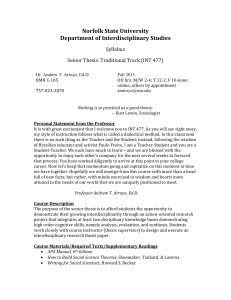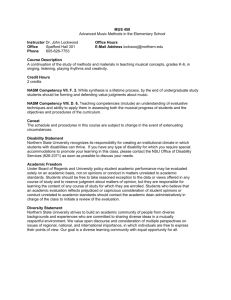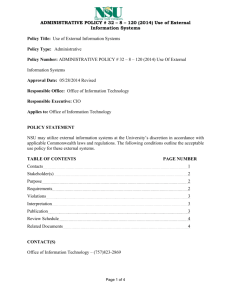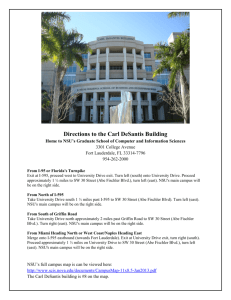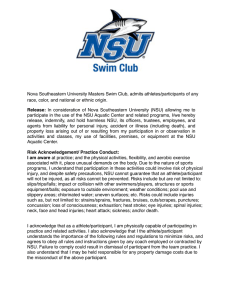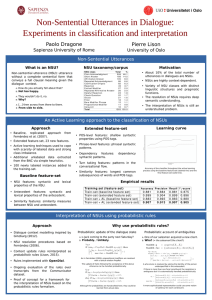INT 477 Senior Thesis
advertisement
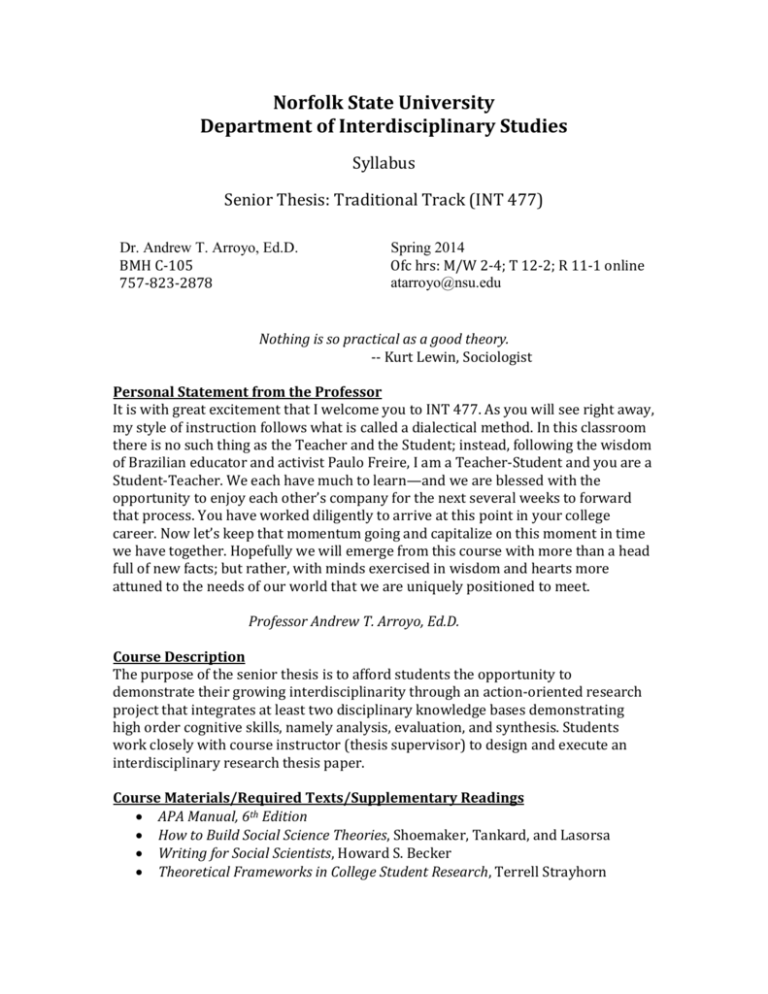
Norfolk State University Department of Interdisciplinary Studies Syllabus Senior Thesis: Traditional Track (INT 477) Dr. Andrew T. Arroyo, Ed.D. BMH C-105 757-823-2878 Spring 2014 Ofc hrs: M/W 2-4; T 12-2; R 11-1 online atarroyo@nsu.edu Nothing is so practical as a good theory. -- Kurt Lewin, Sociologist Personal Statement from the Professor It is with great excitement that I welcome you to INT 477. As you will see right away, my style of instruction follows what is called a dialectical method. In this classroom there is no such thing as the Teacher and the Student; instead, following the wisdom of Brazilian educator and activist Paulo Freire, I am a Teacher-Student and you are a Student-Teacher. We each have much to learn—and we are blessed with the opportunity to enjoy each other’s company for the next several weeks to forward that process. You have worked diligently to arrive at this point in your college career. Now let’s keep that momentum going and capitalize on this moment in time we have together. Hopefully we will emerge from this course with more than a head full of new facts; but rather, with minds exercised in wisdom and hearts more attuned to the needs of our world that we are uniquely positioned to meet. Professor Andrew T. Arroyo, Ed.D. Course Description The purpose of the senior thesis is to afford students the opportunity to demonstrate their growing interdisciplinarity through an action-oriented research project that integrates at least two disciplinary knowledge bases demonstrating high order cognitive skills, namely analysis, evaluation, and synthesis. Students work closely with course instructor (thesis supervisor) to design and execute an interdisciplinary research thesis paper. Course Materials/Required Texts/Supplementary Readings APA Manual, 6th Edition How to Build Social Science Theories, Shoemaker, Tankard, and Lasorsa Writing for Social Scientists, Howard S. Becker Theoretical Frameworks in College Student Research, Terrell Strayhorn Related University-Wide and Course Specific Requirements The following competencies are required and assessed in INT 477: (a) writing; (b) information technology literacy; and (c) critical thinking. By the end of this course, students should be able to write clearly, concisely and analytically. Students’ writings should include demonstration of reading completion and comprehension, application when necessary, critical thinking, independent thinking, analysis, synthesis and argumentation. Students’ critical thinking abilities will be assessed on their presentation of ideas (others and their own), problem-solving capabilities, synthesis, evaluation, analysis and clarity of thought (including language use and comprehension). Course Policies/Requirements Attendance (Participation)/Tardiness Policy—Students are expected to attend every class and to be on time. For face-to-face students, missing more than 20% of classes during the semester will result in an automatic failure for the course, and excessive tardiness will result in a serious reduction of the student’s grade (at the professor’s discretion). For online students, missing more than four discussion boards will result in an automatic failure. Cell Phone Policy—Cell phones should be silenced and put away during class. No texting is permitted at any time. Discussion Board Requirements (online courses only) – Regular participation in the discussion boards is expected. See below. Late Work Policy -- Late work is not accepted unless prior authorization has been given or a doctor’s note is provided after the fact. In the event late work is accepted, it is subject to point deductions at the discretion of the professor, up to 10% per day. Email – Only official NSU email accounts should be used for course correspondence. Students should check their email a minimum of three times per week to avoid missing vital course announcements. Weather Policy—In case of inclement weather, students should listen to local major radio and television stations; visit the NSU website at www.nsu.edu; and/or call the University operator at 757-823-8600. Students are responsible to be present for class unless an official closure has been announced. Online courses are not subject to university closures. Incomplete Policy—You must be passing the course and have completed at least 50% of the work in order to qualify for an incomplete at the professor’s discretion. Incompletes are rarely granted. Disability Policy—In accordance with section 504 of the 1973 Rehabilitation Act and the American with Disabilities (ADA) of 1990, any student with a disability or who thinks s/he may have a disability, please make contact with the Supporting Students through Disability Services (SSDS) Office. Academic Integrity/Plagiarism Policy—Plagiarism is defined as using other people’s work as your own without crediting them, including but not limited to: copying others’ notes, exams, essays, or information, quoting and paraphrasing others’ ideas without giving them credit and proper documentation; using information from the internet without properly citing source, website address (URL), author, date, etc. Plagiarism is a form of cheating and will result in an assignment grade of F and possibly an overall course grade of F. Any instance of academic dishonesty will NOT be tolerated. See the student handbook for a description of the honor policy and the consequences for violations. Use of the World Wide Web for research—For this and all courses I teach, the following sources are acceptable: books, magazines, newspapers, and scholarly journals. No websites are accepted for research purposes in any paper/project. This includes Wikipedia. Success Policy—The best policy for success in any course is preparation, time management, and constant communication with the professor. Be proactive instead of reactive. Attending college is a privilege, not a right. You are accountable for everything that is in this syllabus, and everything covered in class. The buck stops with YOU! Grading Scale: 100-95 = A (Superior) 94-90 = A89-87 = B+ (Very Good) 86-84 = B 83-80 = B79-77 = C+ (Average to Adequate) 76-74 = C (INT majors must earn C or better to gain credit towards graduation.) 72-70 = C69-67 = D+ 66-64 = D 63-60 = D59 & below = F Assignments Attendance/Participation – 10% Proposal – 10% Final deliverable – 80% (See next page for your options.) Course Assignments and Schedule Email the proposal and final thesis in MS Word as attachments to atarroyo@nsu.edu by the dates listed below. Other types of projects may use other programs with prior approval. Proposal due date = Feb 1, 11:59pm Final deliverable due date = April 15, 11:59pm This is an intensive course requiring your constant engagement and discipline. You must be a highly motivated self-starter. Stay with it! ____________________ OPTION A Interdisciplinary theory construction paper. You may write this alone, or with up to two other partners (all will earn the same grade). OPTION B Autoethnographic account of your academic journey. Uses the autoethnographic research method to tell the story of your college career, mixing together your personal life experiences along with the major academic/intellectual themes that caused you to grow and/or impacted you the most. Must be written alone. OPTION C Your own creation. Must be academic and rigorous. Dr Arroyo reserves the right to reject proposals that do not meet a high enough level of challenge. A personal conference is highly recommended to obtain prior authorization before submitting the proposal. May involve up to two other partners (all will earn the same grade).
